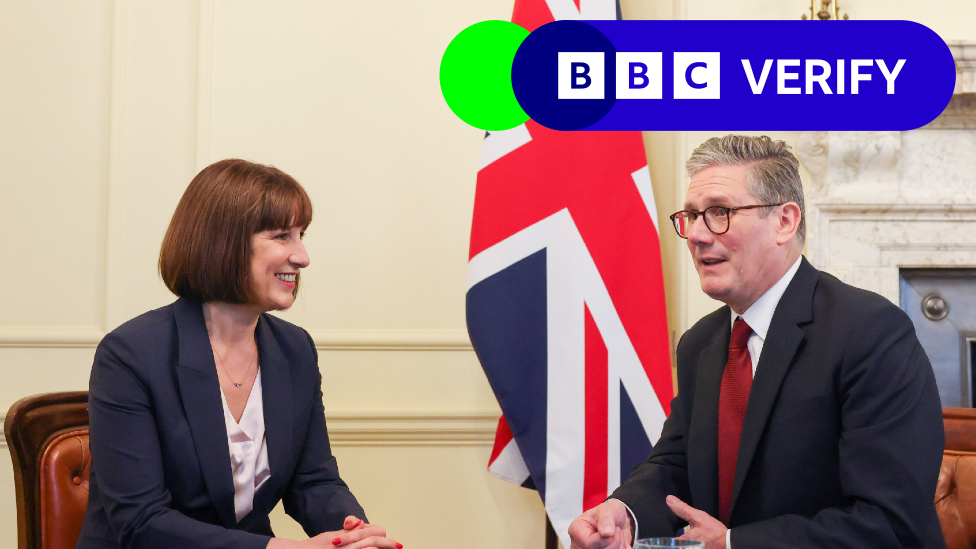Is there a £22bn ‘black hole’ in the UK’s public finances?

- Published
At the Budget, Chancellor Rachel Reeves once again blamed the Conservatives for leaving a "£22bn black hole" in the public finances.
A report from the Office for Budget Responsibility (OBR), which makes forecasts for the government, found there had been information it should have been given by the Treasury, but only listed a £9.5bn shortfall from February.
Nonetheless, it said forecasts in March would have been "materially different" if it had known about all the previous government's spending plans.
Conservative leader Rishi Sunak said the OBR had declined to support Reeves's claims of a £22bn black hole, saying: “It actually appears nowhere in their report.”
Reeves said the £22bn came from the £9.5bn of spending plans reported by the OBR from February, another £7bn before the March Budget, and a further £5.6bn between March and the end of July, including public sector pay awards made by Labour.
Government ministers have repeatedly used the figure to justify the decision to cut the winter fuel payment and raise taxes.
Was there £22bn of unknown spending?
Accompanying a Budget that increased spending by £70bn a year, the OBR published a report on 30 October, external looking at whether there had been information about pressures on spending that it should have known about in February when it was working on its forecasts to go with the March Budget.
It asked the Treasury for an estimate of these pressures and was given a figure of £9.5bn, which is considerably below the £22bn in the July report.
"Had we known that information we would have had a materially different view about the level of public spending this year," OBR head Richard Hughes told BBC News.
"We can't say how different that would have been because we would have had to have had a different conversation with the Treasury in the light of that information."
Reeves told BBC News that the rest of the £22bn was overspent between the Budget and the 4 July election.
Paul Johnson, director of the Institute for Fiscal Studies think tank said Reeves "may be overegging the £22bn black hole".
What about the rest of the £22bn?
The government published a breakdown, external of how it had got from the Treasury's £9.5bn shortfall in February to the £22bn "black hole".
It said that there was another £7bn between February and the actual Budget in March, as departments found out about new spending pressures and the government spent more on the NHS and the Household Support Fund
There was a final £5.6bn between then and late July, which includes almost a month when Labour was in power.
That was largely caused by increases in public sector pay.
It was the Labour government that accepted the recommendations of the Pay Review Bodies (PRBs), but they said that the previous government should have budgeted for more than a 2% increase in public sector pay.
Prof Stephen Millard from the National Institute of Economic and Social Research think tank told BBC Verify: "The 'political' question is whether you would count this as part of the fiscal black hole or not. If you do, then you get to the £22bn figure; if not, then you’re left with around £12.5bn to £13.5bn."
Row over 'black hole' in public finances continues
- Published31 October 2024
Where does the £22bn claim come from?
The £21.9bn figure was in an audit published by the Treasury at the end of July, external – just a few weeks after Labour came to power.
The document looked at areas of public spending which are set to go over budget this year, including:
Public sector pay rises
Overspending on certain projects, such as supporting the asylum system
Unforeseen costs, such as inflation being higher than expected
Military assistance to Ukraine.
At the time, the OBR wrote that it had not been made aware of the extent of overspends, external and said it would investigate.
Was there a big overspend?
To put those figure into context, in the Spring Budget, external it was expected that total public spending this year would be £1,226bn. Either £9.5bn or £22bn would be a small proportion of that.
But by the standards of government overspends, external, either would be unusually large.
Spending was much higher than expected due to Covid in 2020 and 2021 and also almost £10bn higher than expected in 2023 because of inflation caused by Russia's invasion of Ukraine.
Outside those years there have not been overspends close to £9.5bn.
This piece was originally published on 3 September 2024 and has been updated following the OBR report that accompanied the 30 October Budget
